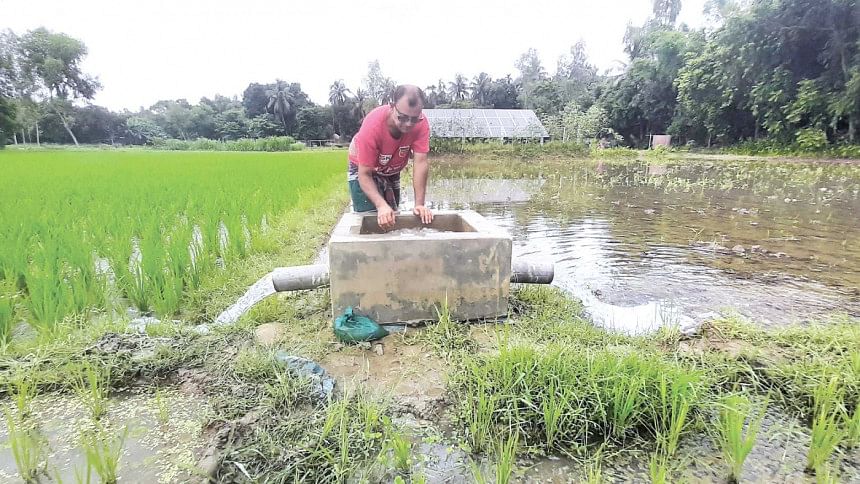Solar irrigation pumps prove a boon for farmers

Farmers who depend on rainwaters to grow Aman paddy in Dinajpur have been left distraught from early July owing to a drought-like situation in the absence of rains.
But many growers have been busy transplanting seedlings of the second-largest paddy crop in the country on their land during the same time in the areas of the northern district that have access to solar-supported irrigation systems.
What is more, the solar-based irrigation pumps have allowed them to avoid frequent power cuts and costly diesel-run pumps to grow the crop.
The picture is the same in many other districts where similar irrigation facilities have sprouted up in recent years in a country where more than 90 per cent of the total cultivable land of 85.6 lakh hectares is irrigated.
Farmers depend on pumps usually to water their Boro paddy fields to grow rice during the dry season and they rely on rainfall to cultivate Aman.
Since there has been less than usual rainfall this month compared to the previous years, growers have been forced to turn to pumps to irrigate lands.
There are around 13.4 lakh diesel-operated pumps, supplying water to 34 lakh hectares of land.
Currently, there are 2,659 solar irrigation pumps in Bangladesh, with an installed capacity of around 50 megawatt-peak (MWp), according to the Sustainable and Renewable Energy Development Authority.
In Dinajpur, at least 324 solar-run irrigation pumps have been installed in seven upazilas, out of its total 13 upazilas, since 2017 to help farmers irrigate their land at reasonable costs and cut electricity and diesel costs, according to the Department of Agricultural Extension (DAE)
Around 4,000 acres of land are now under irrigation coverage and the number of beneficiary farmers in the seven upazilas is around 15,000.
Five companies, including Solargaon Ltd, Gazi Renewable Energy Ltd and Rahimafrooz Bangladesh Ltd, have set up the pumps in the upazilas.
Of them, the highest number of pumps is in Birganj upazila, at 143. There are 63 pumps in Biral, 57 in Bochaganj, 54 in Kaharol, five in Khansama, and one each in Chirirbandar and Parbatipur upazilas.
During a visit to a number of villages in Birganj on Wednesday, it was found that the farmers in the upazila have brought a large part of their farmland under Aman cultivation on time this season despite lesser rainfall.
The drought has been prevailing in the district since early July, affecting the Aman cultivation in the district. The meteorological office in Dinajpur recorded rainfall of only 2 millimetres between July 3 and July 15.
Ziaur Rahman, a solar irrigation pump operator in Nizpara village of Birganj, has been running the pump for the last four years, supporting around 80 farmers.
He said farmers do not need irrigation support to plant Aman seedlings as they get sufficient rains during this time of the year to prepare their land.
"But things have been different this year since there has been a drought-like situation. So, I started to irrigate the land after farmers requested me," said Rahman.
He charges Tk 2,000 to Tk 4,000 to irrigate each acre of land every season. But the charge is lower during the Aman season, he said.
Dabirul Islam, a farmer in Nizpara village, says he has been availing the irrigation facility from a solar-supported pump.
"I would have been in big trouble due to the drought if the solar pump was not there. It is quite reasonable and affordable."
The charge would be around Tk 9,000 if the land is irrigated through diesel-operated pumps, the farmer said, adding that he is paying Tk 4,000 per acre.
Hamidul Islam, a farmer in Banpara village, was able to begin his Aman cultivation on 1.7 acres of land as he used the irrigation support from a solar-run pump.
Around 70 farmers in the village are receiving irrigation support from Krishna Chandra, the pump operator.
Hamidul himself has set up a solar-powered irrigation pump on his land in another area and is supplying water to 70 farmers as well.
Abu Reza Mohammad Asaduzzaman, upazila agricultural officer in Birganj, said renewable energies such as solar power-run pumps can cut dependency on fossil fuels.
The pumps helped farmers during a drought-like situation and when there is a power shortage and the cost of diesel is high, he said.
Salek Solar Power Ltd (SSLP) has set up 70 solar-powered pumps in Bogura's Sonatala upazila with financial assistance from the World Bank, the Japan International Cooperation Agency and state-owned Infrastructure and Development Company Limited (IDCOL).
Abu Saleh, a farmer in Koloshdah village under the upazila, said, "We are getting support from the solar pump. There is no water crisis in the dry season. We are getting sufficient water."
Jahurul Islam, a farmer in Digdair village in the same upazila, said: "Prices of diesel and electricity are higher, but the cost of irrigation that relies on solar-powered pumps is lower. We are not suffering from power cuts or higher prices of diesel."
According to SSLP, it has 84 solar-based pumps in four northern districts -- Bogura, Gaibandha, Sirajganj and Panchagarh, supporting the irrigation of around 10,000 bighas of land.
IDCOL has set up 1,523 solar-powered pumps, accounting for 42.08 MWp, or more than 84 per cent of the countrywide installed capacity.
The Barind Multipurpose Development Authority has installed pumps with a capacity of 4.11 MWp, the Bangladesh Agriculture Development Corporation set up 152 pumps with a combined capacity of 1.97 MWp, and Bangladesh Rural Electrification Board set up 150 pumps with a capacity of 1.2 MWp.

 For all latest news, follow The Daily Star's Google News channel.
For all latest news, follow The Daily Star's Google News channel. 








Comments